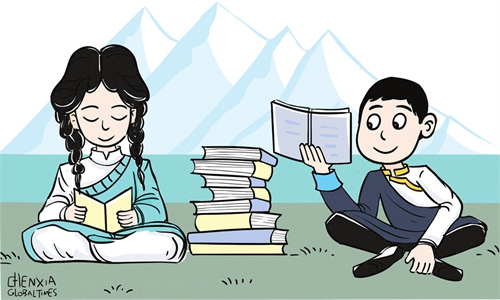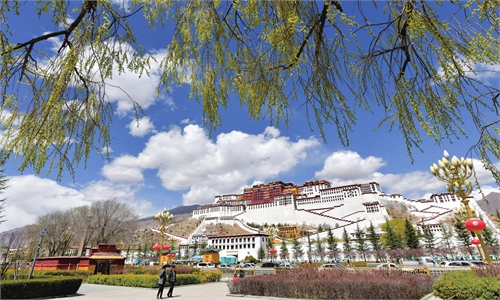Xizang celebrates 65th anniversary of democratic reform
'It's a great feat,' claim locals and experts, slamming Western smears

The Potala Palace in Lhasa, Xizang Autonomous Region Photo: VCG
People across Southwest China's Xizang Autonomous Region have engaged in various celebration activities to mark the 65th anniversary of practicing democratic reform in Xizang, which falls on Thursday. From autocracy to democracy, from poverty to prosperity, and from alienation to freedom, the process of reform has been hailed by local residents and experts as an epoch-making event in the advancement of human rights.
Observers also denounced Western attacks over so-called human rights violations and forced assimilation of culture, noting that they are nothing but fabricated lies out of thin air. A tour of the region will be more than enough to showcase the harmony and unity among various ethnic groups in Xizang, as well as the unremitting efforts of the government to protect and develop local Tibetan culture, they said.
Lhasa, the capital of Xizang, is gearing up for various activities to celebrate this day, including book-sharing seminars and a thousand-person choral competition. Tibet University, a prestigious school in the region located in Lhasa, held a special lecture highlighting the rapid development of Xizang over the past 65 years. The lecturer inspired the audience as he said, "the younger generation, with ideals, abilities, and responsibilities, holds the key to the future of the country and the hope of the nation."
Cona County in the region's Shannan city also held a series of events including exhibitions, museum visits, and film screenings, to review the glorious history of Xizang since the democratic reform. The exhibition featured contrastive photos of old and new Xizang, allowing the audience to experience the significant changes that have taken place in the region, which deepened their understanding of the importance of the reform, local residents said, as quoted by Xizang Daily on Tuesday.
"It's a great feat. Xizang's democratic reform is the most important abolition movement of serfdom in modern world history," Jia Chunyang, executive director of the Economic and Social Security Research Center at the China Institutes of Contemporary International Relations, told the Global Times on Wednesday.
Since the abolition of serfdom, local residents in Xizang have been granted a wide range of political rights, including the right to self-govern their own ethnic and regional affairs, the right to vote and be elected, and the right to information. Currently, Xizang has 24 deputies to the 14th National People's Congress, with Tibetan and other ethnic minority deputies accounting for 66.7 percent of the delegation, data showed.
As for socioeconomic development, Xizang has lifted all 628,000 low-income people out of poverty as of the end of 2019, achieving the historic eradication of absolute poverty. In 1959, Xizang's GDP was only 174 million yuan ($24 million); by 2023, it exceeded 230 billion yuan, with urban and rural residents' per capita disposable income surpassing 50,000 yuan and 20,000 yuan respectively.
Xiong Kunxin, who had been hired by Tibet University as a distinguished professor and lived there for several years, told the Global Times on Wednesday that he had personally experienced the harmonious coexistence and mutual support among different ethnic groups.
"Everyone is united and working diligently on practical matters, rather than just chanting slogans," Xiong said.
The democratic reform in Xizang has completely overturned feudal serfdom under theocracy and implemented the policy of religious freedom.
There are now over 1,700 Tibetan Buddhist religious sites in Xizang, as well as mosques, Catholic churches, and other places of worship. All religions are treated equally, and both believers and non-believers are treated with equal respect.
However, the Western media have recently ramped up efforts to throw mud at Xizang's human rights issues as well as forced assimilation in boarding schools, which Jia slammed with powerful evidence he obtained from the local people.
Jia, who had just shared these figures at a seminar on the sideline of the 55th session of the UN Human Rights Council in Geneva, pointed out that boarding schools are favored by local children and parents because many of their homes are far away from schools, and that the conditions of boarding schools are better.
On-site research conducted by Jia and his team revealed that these boarding schools not only do not restrict or suppress the learning of Tibetan language, but instead attach great importance to the protection and development of it by encouraging Tibetan students to use their mother tongue in daily life and receive education in Tibetan.
The schools have also actively set up Tibetan traditional culture courses or interest classes, such as calligraphy classes, to promote Tibetan culture.



